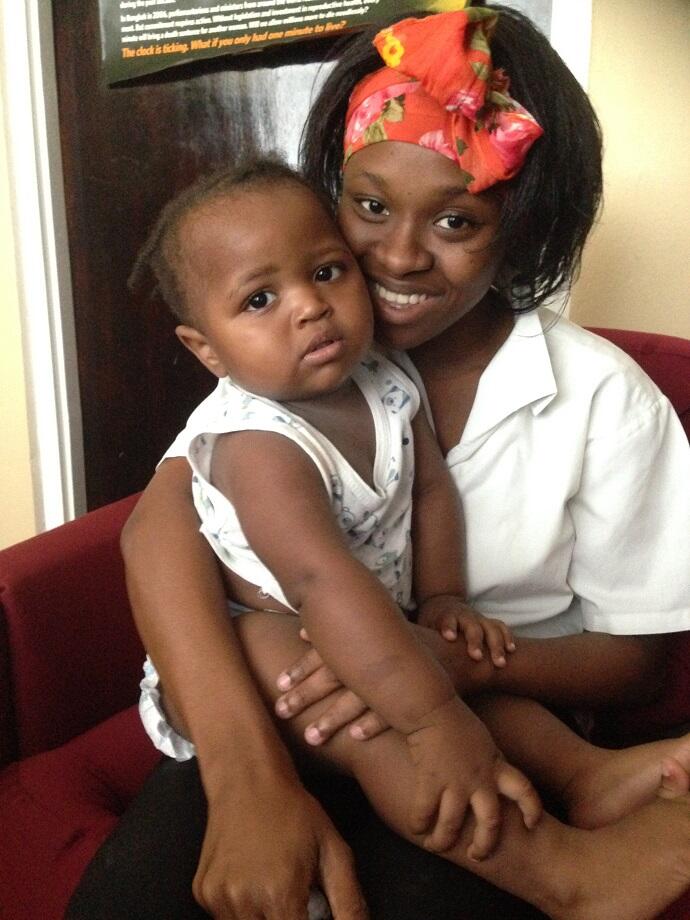In a simple, single-story building on the outskirts of Port of Spain, Trinidad, a few teen girls wear uniforms and sit at a table waiting for the next class to start.
Florence Gonzales, a tall, middle-aged, bespectacled woman, occasionally comes in to talk to them sternly like a schoolmistress.
The baby one girl holds in her arms gives away the fact that these are not typical students and this is not a typical learning institution.
The little house is at the forefront of one of the greatest challenges facing the country and the entire Caribbean region.
It is here that girls come every weekday, during and after a pregnancy, to receive counselling, pre- and post-natal guidance, skills training, and lessons in math, English, and a few other subjects. A caregiver looks after their babies in an in-house nursery.
The attitude of school administrators or an absence of parental support often makes it difficult for the young mothers to continue their education.
The main goal of the centre– one of six that comprises the Choices Adolescent Mothers Programme, a 20-year-old state/NGO partnership - is to prevent participants from having a second pregnancy by giving them support in the first.
Another goal is to get the girls who haven’t yet graduated back to school at some point after they’ve had their babies. Achieving this is a challenge that has gotten easier in recent years as attitudes in schools have softened, said Gonzales, the centre’s manager. She recalled a conversation with one school official who didn’t believe teen mothers should return to school.
“She said, ‘Let them go to evening classes, because they come back like if it’s a trophy they win, and they’re coming to disrupt the school,’ ” said Gonzales. Of course there isn’t a similar concern about teen fathers in schools, she added.
“These young women need to continue their education,” Gonzales said. “If they don’t, what are we doing?”
The Caribbean has an adolescent pregnancy rate that is second only to the poorest region in Africa. One out of five women in the Caribbean has her first child when she is younger than 19.
The age of consent in T&T is 16 years. But girls can get married as young as 12.
Adolescent pregnancy is linked to higher maternal and infant mortality rates. Women from economically disadvantaged backgrounds are more likely to have teenage pregnancies, which further reduce their income–earning and education potential.
The Caribbean Community (CARICOM) has made reducing teen pregnancies a priority. In collaboration with the UNFPA and through consultation with representatives of relevant groups in the region, the CARICOM Secretariat has developed an Integrated Strategic Framework for the Reduction of Adolescent Pregnancy in the Caribbean.
Princess Preddie, one of the mothers at centre, was just a few months short of graduating from secondary school when she realised she was pregnant. Because she wasn’t showing, she was able to sit her final exams without issue. But having to breastfeed her son Jordan made it difficult for her to get a job afterward. Her school’s social worker led her to Choices, where she has been for 14 months.
The programme provides stability during a rocky period that could lead young women to make more poor choices, including those that mean more children.
“For a lot of youths staying home does get you into trouble sometimes,” said Preddie, who is no longer with her son’s father and is supported mainly by her mother.
“When you have something to keep yourself active, you don’t stay home to do something wrong, to put yourself in trouble,” she said.
Preddie said she and her boyfriend took the risk of not using a condom “to see how it felt”. Other girls – the centre once had an 11-year-old attendee, said Preddie - were victims of incest and rape.
For the girls who got pregnant from consensual sex, Gonzales said she doesn’t believe most of them lack knowledge about contraception use. Princess acknowledges that she had access to condoms and information on how to use them.
“I think too many women do not feel bold enough or strong enough to say, ‘I am not having sex with you unless you use of some sort of protection’, because they’re afraid they’ll lose the man,” said Gonzales.
The Choices programme boasts of girls who have gone on to successful lives, running their own businesses and in one case becoming a local government representative.


